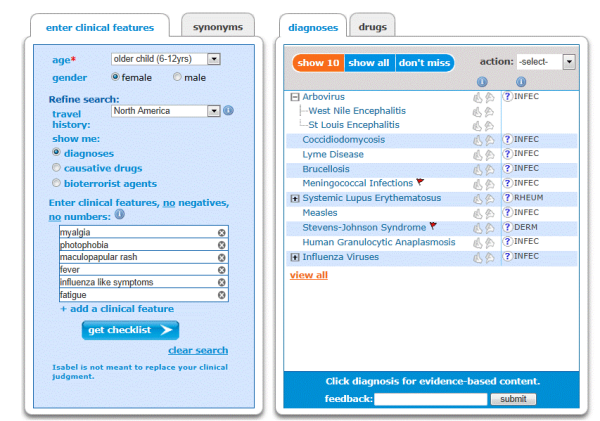- Privacy Policy
- Terms & Conditions
- Contact us
- ©Isabel Healthcare 2025
West Nile Virus: Texas Outbreak
Texas is experiencing an outbreak of West Nile Virus which so far has killed 10 people, and an additional 200 people are currently suffering from West Nile Virus. The Centre for Disease Control and Prevention has stated that nearly half of all cases of West Nile so far this year are in the Texas region.
West Nile Virus is caused by a flavivirus which is transmitted to humans by mosquito bites or through contact with infected blood. Most infections are asymptomatic -- although around 20% of patients develop a self-limited influenza-like illness called West Nile fever, and around 1% of these patients develop neuroinvasive disease which can lead to encephalitis, meningitis, or flaccid paralysis.
West Nile Virus has been seen in Africa, Europe, the Middle East, West and Central Asia, Oceania, North America, Canada, Caribbean and Latin America. West Nile Virus circulates between infected birds and the insects which bite them (female mosquitoes). The infected mosquitoes then bite other animals or humans and the infection can be transferred. Rarely, West Nile Virus has been transmitted by infected blood transfusion or organ transplantation. Other uncommon routes of transmission include mother to fetus via the placenta and needlestick injuries.
Symptoms and testing of West Nile Virus:
- sudden onset fever
- malaise
- myalgia
- arthralgia
- pharyngitis
- anorexia
- abdominal pain
- visual disturbances including visual blurring, vision loss, floaters and flashes
- headache
- rash
- lymphadenopathy
- conjunctival infection
- eye pain
- nausea and vomiting
- splenomegaly
- retinal hemorrhages
The below image shows the Isabel diagnosis decision support application, where the symptoms and demographic for a sample patient have been entered on the left, then submitted to the Isabel query engine, and the differential diagnosis list appeared on the right.
West Nile Encephalitis and differential to consider in other diseases for symptoms entered
CSF and Serum WNV-specific IgM using MAC-ELISA should be ordered if neuroinvasive disease is suspected. CSF protein, CSF cell count will be elevated if neuroinvasive disease is present and the CSF glucose will be decreased. A complete blood count may show leucocytosis, anemia, lymphopenia and thrombocytopenia. Hyponatremia may be present. If hepatitis is suspected as a complication then there may be elevated LFTs. Elevated amylase suggests pancreatitis. A CT of the head can be performed if neurological symptoms are present, it isn’t diagnostic but can help rule out meningitis, encephalitis, stroke and abscess which may be on the differential workup list.
Differential diagnosis:
Other diseases to rule out depending on symptoms the patient presents with include HSV encephalitis, St Louis encephalitis, Eastern and Western equine encephalitis, Meningitis (bacterial, cryptococcal and tuberculosis), Guillain-Barre syndrome and Lyme disease, Legionnaire disease, Brain tumor or abscess and CVA.
Treatment:
This is supportive and the majority of cases are self-limited. If complications develop like dehydration or the patient is experiencing neuro symptoms such as headaches, photophobia then hospitalisation is necessary for intensive supportive treatment to be carried and administration of IV acyclovir.
Prevention:
Clinicians should advise patients to avoid mosquito bites by staying indoors between dawn and dusk, using insect repellent, wearing protective clothing like long sleeved shirts and trousers.
In patients experiencing neurological manifestations of this nature, prompt diagnosis and workup is essential to quickly rule out diagnoses and properly diagnose the condition to prevent further neurological deterioration. Isabel’s clinical decision support system can help you generate your differential list and give you access to information on what tests to order and treatment plans to action. Read more about clinical diagnosis decision support in the free white paper available today.

Mandy Tomlinson
Mandy has worked for Isabel Healthcare since 2000. Prior to this, she was a Senior Staff Nurse on the Pediatric Infectious disease ward and high dependency unit at one of London's top hospitals, St Mary’s in Paddington which is part of Imperial College Healthcare NHS Trust. Her experience in the healthcare industry for the past 33 years in both the UK and USA means she's a vital resource for our organization. Mandy currently lives and works in Scottsdale, Arizona.
Subscribe Here!
Recent Posts
Isabel DDx Companion with ChatGPT Integration - to help you diagnose even faster
At Isabel Healthcare, we’ve always been driven by one goal: to make clinical reasoning faster,..Virtual Triage: Do more questions lead to better patient outcomes?
One of the common misconceptions related to virtual triage / symptom checker tools is that the more..List Of Categories
- Differential Diagnosis Decision Support
- Differential diagnosis
- Symptom Checker
- Symptoms
- Medical Error
- Patient Disease Information
- Disease
- Clinical Decision Support
- Diagnostic Decision Support
- Isabel 1 Minute Read
- Diagnosis Error
- Diagnosis Skills Cases
- Healthcare Informatics
- Clinical Reasoning
- Evidence-based Medicine
- Medical Education
- Patient Engagement
- Symptom Triage
- Nurse Practitioner Education
- Nursing Decision Support
- Partnership
- Public Health
- COVID-19
- EHR
- Patient Empowerment
- Patient Safety
- rare disease

Start your FREE Trial today
Try the Isabel Pro DDx generator for 30-days - no payment card details required.




